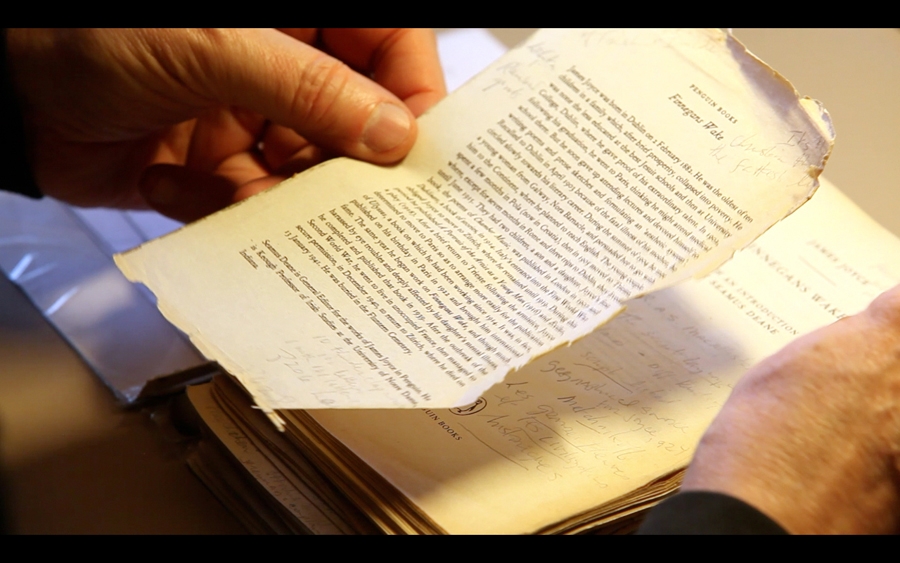“We are all going to go to hell as a result of reading this!” says one of the members of the Joycean Society in a 2013 film by Dora García that takes the group’s name as its title. Since 1986 this band of enthusiasts has met every week in Zürich to read James Joyce’s last novel, Finnegan’s Wake (1939), together. It took the serious-looking participants 11 years to get through the book, and they are now on the third lap. The pioneers have aged with the collective reading, remembering when the stairs leading to the meeting room were not an obstacle. Newcomers have joined along the way, and when García and her crew come to spend time with the society, a couple of youngsters are present.
The camera sits in the middle of the room, gently following a humorous prereading conversation about the effects of artists earning too much money and about how to make sure that people are dead before they are buried. The conversation then turns into a discussion based on a close reading of the notoriously opaque book, literally word by word. They debate the meaning of ‘onon, onon’ on page 201 and move on to ‘shabby genteel’, ‘joys of ills’ and ‘peduncle’. Maybe ‘great Scott’ is another way of saying ‘great God’? Meanwhile squeaking chairs and rustling snack-bags contribute to the soundscape, a snow-covered bronze statue of Joyce smoking a cigarette fills the frame and the person holding the suspended microphone suddenly becomes visible.
The atmosphere in the film is intense. Each person has his or her own way of dealing with the text, but it is the extremely concentrated common endeavour of decoding it and, to some degree, understanding the limited number of rules that Joyce supposedly employed in writing the novel that stands out. It is clear that the participants enjoy what they are doing and that they are unusually knowledgeable – the way nerds tend to be – without being professional historians of literature. Most of the readers are men. Witty and fascinating comments, suggestions and questions pertaining to specific terms fly fast across the room in a performance of collective intelligence at its most beautiful.
Garcia has captured something rare and yet urgent, even overwhelmingly so: individual passion and commitment being shared and debated with others under strikingly consistent conditions
Ever since I saw García’s film in Monaco’s pavilion at the Venice Biennale last year I have been thinking about it. About the fact that she has captured something rare and yet urgent, even overwhelmingly so: individual passion and commitment being shared and debated with others under strikingly consistent conditions. When Vdrome – an online initiative presenting a new videowork every week – recently featured the film, I was reminded that the scenario could be seen as irrelevant navel-gazing. But I think it is the opposite. It speaks of a contemporary need for depth, continuity and pleasure, without having to think about consequences – whether they be the time it consumes or the absence of palpable outcomes. It is about a way of acting in the world, a sort of approach that allows for things to mature slowly and precisely. By doing so, the people involved not only place art centre stage at a time when art often ends up in the margins of even the artworld itself – albeit in this case we’re dealing with a text that has been canonised and its author hailed as a ‘master’. Like true nerds, the members of the Joycean Society also perform a continuous engagement without necessarily reaching a conclusion.
This kind of focused and loving attention is a scarce phenomenon today, when neoliberalism’s atomisation and disruption of life lived small and large is reaching new heights. One of the participants in the reading group calls their joint activities ‘addictive’. It is also described as a unique reading experience and even as therapy. Undeniably the participants take a lot of pleasure in this approach to reading Finnegan’s Wake : one person in the film argues that engaging with literature this way is an example of how culture is a substitute for pleasures denied to us. But art is more than that; it is that which makes it possible for us to articulate the experience of pleasure, but also of pain and all the rest of it, in order to share it with others.
Stealth activities like the ones of the Joycean Society’s reading group and its stubbornly cooperative investment and inconclusive aim comprise nothing less than an act of resistance to current pressures, whether conscious or unconscious. At the same time, both García’s film and the reading group itself represent a triumph of the nerds and their commitment to pleasure. This kind of engagement is the future, even if it means going to hell.
This article was first published in the September 2014 issue.
